What is an OB-GYN?
An obstetrician-gynecologist, or OB-GYN, has expertise in female reproductive health, pregnancy, and childbirth. Some OB-GYNs offer a wide range of general health services similar to your primary care doctor. Others focus on the medical care of the female reproductive system.
OB-GYNs also provide routine medical services and preventive screenings. This type of doctor has studied obstetrics and gynecology.
The term “OB-GYN” can refer to the doctor, an obstetrician-gynecologist, or to the sciences that the doctor specializes in, which are obstetrics and gynecology.
What is obstetrics?
Obstetrics is the branch of medicine related to medical and surgical care before, during, and after a woman gives birth. Obstetrics focuses on caring for and maintaining a woman’s overall health during maternity.
This includes:
- pregnancy
- labor
- childbirth
- the postpartum period
OB-GYNs can conduct office visits, perform surgery, and assist with labor and delivery. Some OB-GYNs provide services through a solo or private practice. Others do so as part of a larger medical group or hospital.
How to Become an OB/GYN
Want to become an OB/GYN? Lets look at how many years of college education it will take to practice in this career path.
You will need an undergraduate degree, which takes 4 years, before you attend medical school, which takes another 4 years, before others can call you doctor.
After those eight years of school, you will then need to do a residency or an internship in obstetrics and gynaecology before you can practice it.
It takes about 12 years to become an OB/GYN doctor after high school. Lets talk about how to prepare for this career.
Prepare to be a doctor
- Get the appropriate preparatory undergraduate degree.
After high school, enroll in a bachelor’s degree. It can be any type of 4-year undergraduate degree, whether a BS, BA, or an AB, as long as it will have a good measure of science and math courses.
In fact, it will be to your advantage to choose a degree that has a high concentration in the sciences, such as a Biology, Physics with laboratory credit units, and Chemistry with laboratory credit units.
You will also need to obtain a high GPA from your bachelor’s degree because academic performance increases your chances of admission to medical school.
- Take the Medical College Admission Test (MCAT).
Prepare and perform well in the MCAT. This is another thing that the admission committee will look into when evaluating your application for medical school. The MCAT will include biology, chemistry, and physics; and reading and writing.
- Complete Medical School.
Assuming that you have shown exemplary GPA and MCAT, remarkable extracurricular activities and volunteer work, convincing essay and interview, you will get accepted to medical school in a breeze.
Completing medical school, though, is quite another matter. It will be 4 arduous years of combined didactic learning and clinical instructions.
Had you made up your mind earlier about pursuing Ob-Gyn as a specialty during residency, you must do particularly well in your Ob-Gyn clinical rotations during the third year in med school. During internship, it will also help you later if you will choose sub-internship in Obstetrics-Gynecology.
- Take the US Medical Licensure Exam (USMLE).
The USMLE is a tri-step licensure exam. It is being handled jointly by the Federation of State Medical Boards (FSMB) and the National Board of Medical Examiners (NBME).
US students enrolled in accredited schools qualify to take the first 2 steps of the licensure at certain points in med school. Upon completion of the medical program and the 2 steps, they qualify to take the third step.
Results of the USMLE will be required when you apply for licensing from the State Medical Board where you intend to practice.
- Complete the internship and residency training.
In the past, internship usually was the terminal phase of medical school. Recently, however, most programs place internship in the first year of residency.
To become an OB-GYN, a medical degree graduate must devote another set of 4 years for the residency training program. Courses will focus on gynecology, obstetrics, and gynecological surgery.
As a resident doctor in training, you will be paid a modest salary and will work under the supervision of senior Ob-Gyn physicians.
- Obtain your license and certification.
If you have earlier taken and passed the 3-step USMLE, obtain a license from the State Medical Board where you intend to practice. If you have not earlier completed the exam, it’s not too late to complete it now.
However, there are required gaps between each step so you would be wise to take the preliminary steps ahead of time. The license gives the Ob-Gyn doctor the authority to practice the profession legally.
Most Ob-Gyn doctors also secure board certification from the American Board of Obstetrics and Gynecology.
There will be a board certification exam that must be successfully passed. Certifications and credentials are considered as the standards for the practitioner’s accountability, professionalism, and proficiency in the specialty area.
Opportunities for furthering your career
You may pursue a fellowship to sub-specialize in gynecological oncology which involves surgery and treatment of female patients suffering from cancers of the reproductive organ. This advanced field will take another 3 years of training.
Advanced positions will open opportunities for higher salary brackets, more rewarding private practice, or positions of greater responsibility in medical institutions.
Later in the career, an Ob-Gyn with post-training in a sub-specialty area may want more control of their hours and number of patients, i.e. fewer on-calls, focus on gynecology or oncology cases, and less cases of obstetrics.
Skills and personal qualities you need to develop
Medical schools and training institutions will develop your technical and medical skills. But it is how well you know yourself and how you make the effort of improving your personality that will help you cope with the demands of the job. You will need to know how to manage stress.
More often than not, you will have two lives in your hands – the life of a mother and that of her child. That alone is stressful, and knowing how to deal with it is a requirement. Develop people-skills.
A patient returns to an Ob-Gyn doctor because of the trust that the doctor inspires and the reliability that the doctor exudes.
Salaries and job outlook
The US Bureau of Labor Statistics reported that the average annual salary of OBGYN physicians in May 2012 was $216,760.
Resident doctors in training, however, are paid less than a fourth of that annual average.
The projected increase in the number of jobs in 2020 is high at a growth rate of 24%. The average growth for all occupations is only 14%, so there clearly is a strong demand for doctors, in general, in the years ahead.
Are you up to it?
You will have to be sure with yourself, if you eventually decide to follow this career path. Are you up to the challenges and seemingly interminable period for education and training?
After high school, the total number of years is 12 years of continuous education and training.
The period to prepare, review, and complete the requirements for SAT, MCAT, USMLE, licensing and certification was not yet included in the total.
For pursuing a sub-specialty area, add 3 to 4 years of training.





